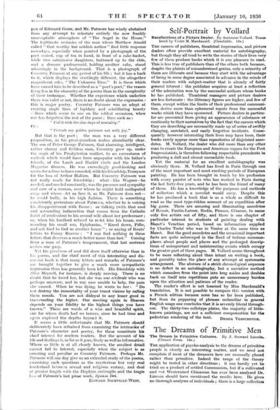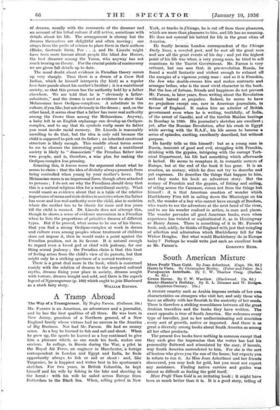The Dream in Primitive Cultures. By J. Steward Lincoln. The
. Dreams of ..P.rinutive Men
(Cresset Press. 1Ss.) '
Tax application of psycho-analysis to the dreams of primitive people is clearly an interesting matter, and we need not complain if most of the dreamers here are unusually placed rather than primitive. Indeed the range of the • theory might be tested in other directions ; it can hardly yet be tried on a product of settled Communism, but if a cultivated -and not Westernised Chinaman has ever been analysed Dr- Lincoln should have Mentioned the results here. He gives no thorough analyses of individuals ; there is a large collection
of dreams, usually with the comments of the dreamer and an account of his tribal culture if still active, sonhetiratis with details about his life. The arrangement is clumsy but the dreams themselves are delightful and often moving ; one strays from the paths of science to place them in their authors (Blake, Gertrude Stein, Poe . . .), and Dr. Lin&ln might have been more human about people like blind Joe Homer, the best dreamer among the Yuma, who anyWay has not much bearing on theory. For the crucial points of controversy we arc given full details up to date.
The usual doubt about evidence in Freudian theory comes up very sharply. Thus there is a dream of a ,Crow Red Indian, which he himself interprets (by hint) as a regular love-hate puzzle about his mother's brother ; it is a Matrilineal society, so that this person has the authority held by a father elsewhere. We are told that he' is " obviously a father- substitute," and the dream is used as evidence to shOW that Melanesians have Oedipus-complexes. A substitute in' the culture, if you like, but not obviously in the dream ; and, on the other hand, it seems clear that a father has more real authority among the Crows than among the Melanesians. Anyway, a baby left in an English orphanage can develop an Oedipus- complex, and to say that its symbols really mean its father you must invoke racial memory. Dr. Lincoln is reasonably unwilling to do that, but the idea is only odd because the child is supposed to pick out its father ; an inherited emotional structure is likely enough. This muddle about terms seems to me to obscure the interesting point ; that a matrilineal society is likely to " disasiociate " the Freudian, father into two people, and is, therefore, a wise plan for making the Oedipus-complex less pressing.
Granting this, it leaves room for argument about what be seems to claim : that the idea of divinity always proceeds from being controlled when young by your mother's lover. The Melanesian mana is an impersonal force, though often attached to persons ; I do not see why. the Freuclians,,should deny that this is a natural religious idea for a matrilineal society. What would count-as evidence about that is g table of the relative importance of mana and Male-deities n 'societies where the father has more and less real authority over the child, also in societies where the mother has to be chaste for more and less years till the child is weaned. Dr. Lincoln does not attempt this, though he shows a sense of evidence uncommon in a Freudian when he lists the proportions of primitive dreams of different types. But if he proved, what seems to be one of his theses, that you find a strong Oedipus-complex at work in dream and culture even among peoples whose treatment of children does not impose it, then he would make a point against the Freudian position, not in its favour. It is natural enough to regard even a loved god or chief with jealousy, for one thing sexual jealousy ; the Freudian claim is that this knot of feeling arises from the child's view of its parents, but that might only be a striking specimen of a normal tendency.
There is a great deal more in the book, which is concerned mainly with the relation of dreams to the accepted cultural myths, dreams fixing your place in society, dreams sought with torture, dreams bought and sold, and there is the superb legend of Ngurangurane (p. 160) which ought to join Bluebeard











































 Previous page
Previous page